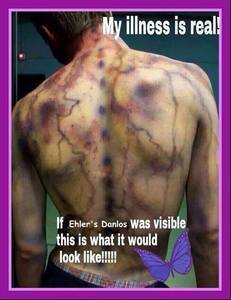If you or someone you know has Ehlers-Danlos syndrome (EDS), you probably know a great deal about it, making you part of a very small population.
Not many people have an understanding for the disease, and they may look at you like you have two heads when the topic of EDS comes up. This means raising awareness of this rare syndrome is important.
So, for the uninitiated, according to the Ehlers-Danlos National Foundation (EDNF), EDS is a genetic defect that causes problems with a body’s connective tissue.
You may notice people with EDS appear weak and fragile–this is the result of an insufficient amount of collagen, the “glue” that keeps the body together. People who have EDS may have hypermobility of their joints, meaning their joints can “pop” out of place more easily, fragile tissues, and skin extensibility. There are six different types of EDS, but the most severe is called Vascular Type EDS, because of the threat of arterial or organ rupture.

In May 2016, The EDNF and EDS UK are joining medical professionals from around the world for the EDS International Symposium in New York City. Among the topics on the agenda are “improving diagnostic protocols” and “creating guidelines for HCPs” to use once a patient has been diagnosed with EDS. It’s hoped that these actions will result in a cohesive means of managing a patient’s particular type of EDS. Organizers are optimistic that the symposium will lead to increased research, funding, and most importantly, awareness.

Plans for the symposium have not been finalized at the time of this writing, but if you would like more information about the event, click here!






